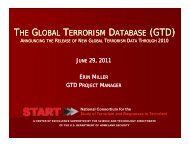- Page 1 and 2: THIS WHITE PAPER IS PUBLISHED JOINT
- Page 3 and 4: 2.6.B. Infectious Disease and Socia
- Page 5 and 6: Executive Summary (Rosa Affleck, To
- Page 7 and 8: The rim of the wheel is a series of
- Page 9 and 10: that ultimately, the strategic aspe
- Page 11: Joe Hewitt (3.4) contributes “The
- Page 15 and 16: esponsibility for states, and their
- Page 17 and 18: 1.2 Catalyzing State Functionality:
- Page 19 and 20: The program has addressed the proce
- Page 21 and 22: and making large numbers of citizen
- Page 23 and 24: 3 ISE continues to invite discussio
- Page 25 and 26: albeit with variations, including f
- Page 27 and 28: Canada, New Zealand, and the U.S. (
- Page 29 and 30: Turkey 21 68 98 224% 44% Labor Forc
- Page 31 and 32: Migration is a response to differen
- Page 33 and 34: 2.1.B. Demography and Security (Jac
- Page 35 and 36: populations of 75 million or more.
- Page 37 and 38: Canada, and Japan, decreasing birth
- Page 39 and 40: 2. Increase Immigration. Secondly,
- Page 41 and 42: States did not reach this level unt
- Page 43 and 44: Finally, given the huge pressures f
- Page 45 and 46: 2.1.C. Demographic Security (Elizab
- Page 47 and 48: Figure 2.1.C-2. Risk of Civil Confl
- Page 49 and 50: The influence of age structure on d
- Page 51 and 52: countries with youthful populations
- Page 53 and 54: This article attempts to address wh
- Page 55 and 56: Banking Crises and Domestic Agitati
- Page 57 and 58: esponsible for all refunds. Further
- Page 59 and 60: Thus, the analyses in this article
- Page 61 and 62: to afford and withstand a banking c
- Page 63 and 64:
conducted using GINI had an overall
- Page 65 and 66:
The models used for the analyses in
- Page 67 and 68:
We found some support for those who
- Page 69 and 70:
39 Carstens, Agustin, Daniel Hardy
- Page 71 and 72:
92 Rose, Richard, Doh C. Shin and N
- Page 73 and 74:
141 Jaccard, James, Robert Turrisi
- Page 75 and 76:
U.S. national security is defined a
- Page 77 and 78:
Linkages: Economics to U.S. Nationa
- Page 79 and 80:
2.3. Water 2.3.A. Water and Securit
- Page 81 and 82:
There are, however, river basins at
- Page 83 and 84:
efforts deteriorated, so too did so
- Page 85 and 86:
What Does This Mean to Water and Se
- Page 87 and 88:
Marshal Gibbons Ogden 1808: Gallati
- Page 89 and 90:
learn about how type 3 countries in
- Page 91 and 92:
typhoid, dysentery, hepatitis A and
- Page 93 and 94:
Population Changes. The world’s p
- Page 95 and 96:
Integrated Water Resources Manageme
- Page 97 and 98:
21 “Integrated Water Resources Ma
- Page 99 and 100:
2.3.C. Water Security and Scarcity:
- Page 101 and 102:
for expansion (Wegerich, 2009). Alt
- Page 103 and 104:
destabilize Western Afghanistan if
- Page 105 and 106:
Afghanistan explosively, slowing or
- Page 107 and 108:
Appendix 2. Figure 2. Central Afgha
- Page 109 and 110:
Food and Agriculture Organization (
- Page 111 and 112:
2.4. Changing of Climate and State
- Page 113 and 114:
Today’s Population Demographics T
- Page 115 and 116:
ecosystem of the massive Mississipp
- Page 117 and 118:
Table 2.4.A-2. The Mosquito Vectors
- Page 119 and 120:
odents, such as the US West and the
- Page 121 and 122:
The Globalization and Industrializa
- Page 123 and 124:
3. The earth is warming and the pac
- Page 125 and 126:
30. Raoult D, Fournier P-E, Fenocca
- Page 127 and 128:
Economics, Resources, and Developme
- Page 129 and 130:
Security concerns and issues do not
- Page 131 and 132:
3 Yalowitz, p. 13 4 Gautier, G. L.
- Page 133 and 134:
Stern addresses the impacts of glob
- Page 135 and 136:
Vulnerabilities to Climate Change a
- Page 137 and 138:
Considering the historical evidence
- Page 139 and 140:
change mitigation can be defined ge
- Page 141 and 142:
5 Wolf, A.T., A Kramer, A. Carius,
- Page 143 and 144:
Carpenter, S.R., P.L. Pingali, E.M.
- Page 145 and 146:
Energy 2.4.D. Energy, Africa, and C
- Page 147 and 148:
Researchers who have systematically
- Page 149 and 150:
another Rwanda happen. However, whe
- Page 151 and 152:
2.4.E. Energy: A National and Globa
- Page 153 and 154:
500 450 400 350 300 250 200 150 100
- Page 155 and 156:
to combat environmental pollution.
- Page 157 and 158:
The first and most important step i
- Page 159 and 160:
impacts, and reduced environmental
- Page 161 and 162:
Recognizing the characteristics of
- Page 163 and 164:
Figure 2.5.B-9. A Snapshot of Selec
- Page 165 and 166:
more than 42 years. That is, the le
- Page 167 and 168:
Using average values from the liter
- Page 169 and 170:
27 Coal Power database, U.S. Depart
- Page 171 and 172:
2.5. Food 2.5.A. World Food Availab
- Page 173 and 174:
also are the source of clean air, w
- Page 175 and 176:
preserve critical wildlife habitats
- Page 177 and 178:
3 von Braun, J. (2007). “The worl
- Page 179 and 180:
2.5.B. Food Production in Arid Regi
- Page 181 and 182:
ut the impacts of leaching salts pr
- Page 183 and 184:
Sustainable use of treated waste wa
- Page 185 and 186:
2.6. Epidemics 2.6.A. Epidemics: A
- Page 187 and 188:
populations, migrants, prostitutes)
- Page 189 and 190:
egions. Initiatives that are purely
- Page 191 and 192:
2.6.B. Infectious Disease and Socia
- Page 193 and 194:
HIV in the early 1980s is likely th
- Page 195 and 196:
treatment are lost until an outbrea
- Page 197 and 198:
3. Social Science Modeling and Anal
- Page 199 and 200:
what in-sample analysis will allow.
- Page 201 and 202:
groups. 45 This examination of oper
- Page 203 and 204:
31 O'Brien, S. P. (2002). "Anticipa
- Page 205 and 206:
Figure 3.2.A-1. Simplified Cultural
- Page 207 and 208:
“Tragedy of the Commons,” in wh
- Page 209 and 210:
Anthropological Theories of Collaps
- Page 211 and 212:
exacerbate rather than resolve prob
- Page 213 and 214:
14 Handwerker, W. P. (1986). “The
- Page 215 and 216:
The following section presents a me
- Page 217 and 218:
mutually exclusive and exhaustive c
- Page 219 and 220:
For example, the national televisio
- Page 221 and 222:
Figure 3.4-1. Risk of Future Instab
- Page 223 and 224:
Infant Rates Militarization Neighbo
- Page 225 and 226:
Overview of Results Table 3.4-2 lis
- Page 227 and 228:
Table 3.4-3 lists the 17 countries
- Page 229 and 230:
een newly classified as partial dem
- Page 231 and 232:
In addition, the indicator for econ
- Page 233 and 234:
Table 3.4-5 - The Peace and Conflic
- Page 235 and 236:
armed conflict. The symbol indicat
- Page 237 and 238:
3.5. Perception is Reality: Stabili
- Page 239 and 240:
the Gallup World Poll. The World Po
- Page 241 and 242:
unstable areas, the most critical n
- Page 243 and 244:
3.6. Assessing the Stability of Int
- Page 245 and 246:
games of complete information and b
- Page 247 and 248:
4 Kahn, Herman (1962). Thinking Abo
- Page 249 and 250:
2. A partnership is not a relations
- Page 251 and 252:
is necessary is that the payoffs fo
- Page 253 and 254:
2. Implications for Setting up the
- Page 255 and 256:
how to be selective. We have alread
- Page 257 and 258:
10 Making Partnerships Work on the
- Page 259 and 260:
3.8. Process Query System as a Fram
- Page 261 and 262:
for associating evidence, events, o
- Page 263 and 264:
e instantiated to accommodate the n
- Page 265 and 266:
The table below describes examples
- Page 267 and 268:
16 S. Oh et al., A Scalable Real-Ti
- Page 269 and 270:
mid-1980s, Battelle introduced one
- Page 271 and 272:
increase or decrease the a priori p
- Page 273 and 274:
ather than being buried as so many
- Page 275 and 276:
state. American foreign policy woul
- Page 277 and 278:
14 E. J. Honton, G. S. Stacey, and
- Page 279 and 280:
community preparedness, but no docu
- Page 281 and 282:
Societal and Community Resiliency:
- Page 283 and 284:
1 World Conference on Disaster Risk
- Page 285 and 286:
Figure 4.1-1. The Multi-organizatio
- Page 287 and 288:
Table 4.1-1. Summary Social Science
- Page 289 and 290:
1 U Sudan Strategic Assessment TTPs
- Page 291 and 292:
Approach - Analyzing a Region as a
- Page 293 and 294:
situations, this analysis is perfor
- Page 295 and 296:
a rapid assessment. Gaining access
- Page 297 and 298:
Appendix A. Acronyms A2C2 ACH ACM A
- Page 299:
TCS ToL TRADOC TTPs UNO USAFA WHO W





